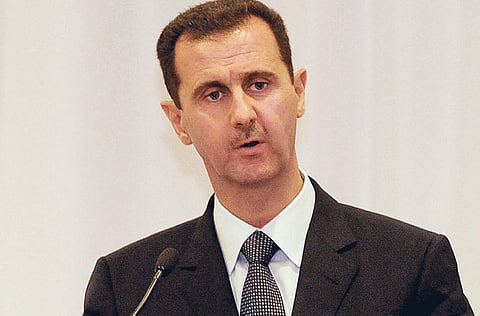Al Assad marks a decade in power
Syrian president has steered the country through difficult times; his commitment to his people is undiminished

When taking the podium of Syria's historic parliament on July 17, 2000, the 34-year old ophthalmologist Bashar Al Assad said: "I am not after any post, nor do I avoid any responsibility. The post is not an end but a means to achieve an end".
The world was watching Syria's new president with hope and grand expectations. Young Syrians were especially optimistic about the new president, who spoke a language that they could associate with when it came to reforms, change and opportunity. Al Assad after all, was younger than his 19 predecessors.
Today, Syria quietly celebrates his 10th anniversary in power — one of the toughest decades in Syria's modern history. Within his first weeks in office, Al Assad passed decrees affecting all aspects of commercial, educational and political life.
Private universities and private schools, monopolised by the government since the days of the Ottoman Empire, were allowed to operate in Syria.
So were private banks, which for 37 years had also been under firm control of the government after being nationalised first by Jamal Abdul Nasser and then by the early Baathists in 1963. The Syrian Securities Exchange (DSE) was inaugurated in Damascus in March 2009, aimed at increasing foreign investor confidence.
The Middle East changed — seemingly forever — when in September 2000 the intifada broke out in Palestine, diverting Syria's attention from domestic reform to regional politics. Several momentous events followed, shaking Syria and the region.
These included the 9/11 attacks, the 2003 Iraq war, the 2005 assassination of Rafik Hariri, the Lebanon war of 2006 and, more recently, the Gaza war of 2008. During every one of these crises, a litany of accusations were fired at Damascus; including claims that it was harbouring Saddam Hussain, that security at the Syrian-Iraqi border was lax, and that it was supporting the Sunni insurgency in Baghdad.
Smear campaign
This was followed by a massive smear campaign in the US and Israeli media, with references to possible regime change in Damascus. In Lebanon, Syria was accused of killing its former ally, Hariri, in 2005, and of supporting a Hezbollah campaign to seize control of the state.
The media and political barrage led to the withdrawal of the US ambassador from Damascus and climaxed with a military assault in late 2008, when US soldiers invaded Syrian territory, killing seven Syrian civilians in a mission claimed to target Al Qaida fighters. These actions obviously angered the Syrians and put them on the offensive for much of the past decade.
Syria's relationship with George W. Bush was not always as bad as it became towards the end of his second term in office. Syria was among the first Arab countries to condemn 9/11, and share intelligence with the US on terrorists operating in Europe and the Middle East, given that many members of Al Qaida were former members of the outlawed Syrian Muslim Brotherhood.
William Burns, then assistant secretary of state for Near East affairs, famously said that Syria had "helped save American lives" through counter-terrorism cooperation. Bilateral relations deteriorated during the war in Afghanistan in 2001, however, and reached rock bottom when the US Army stormed into Iraq in March 2003.
The lowest point of the past 10 years was the assassination of Rafik Hariri in Beirut. Large anti-Syrian demonstrations took place in Lebanon hours after Hariri's death. In March 2005, Al Assad appeared before parliament and said Syria had no desire to confront the UN or the international community, declaring that the Syrian Army, which had been in Lebanon since 1976, was going to return to Syria.
He added that his country would comply with the wishes of the Lebanese, and the Taif Accords. An international investigation into the Hariri murder followed. In October 2005, it issued its first report, authored by the German prosecutor Detlev Mehlis.
It read like a crime novel, and blamed Syrian and Lebanese security officials for the Hariri murder. Sensational stories were woven into the report, which were discredited by subsequent reports issued by the UN.
The world, taking its cue from Barack Obama, opened up to Syria in 2009, starting with King Abdullah of Saudi Arabia and then Lebanese Prime Minister Saad Hariri, who mended fences by visiting Damascus in December, and declaring that the "skies were blue between Syria and Lebanon".
Today, Al Assad's foreign policy continues to reflect his country's commitment to Hamas, Hezbollah and Iran. Speaking to journalists during his recent trip to Latin America, he said that "the world will not respect us unless we are strong".
Al Assad wants Syria to take its rightful place in regional and international affairs, as befits a country that can deliver peace and security to the Middle East. To achieve this, Al Assad and his people believe Syria must regain control of the Golan Heights, which remains the president's number one objective.
Sami Moubayed is editor-in-chief of Forward Magazine.


